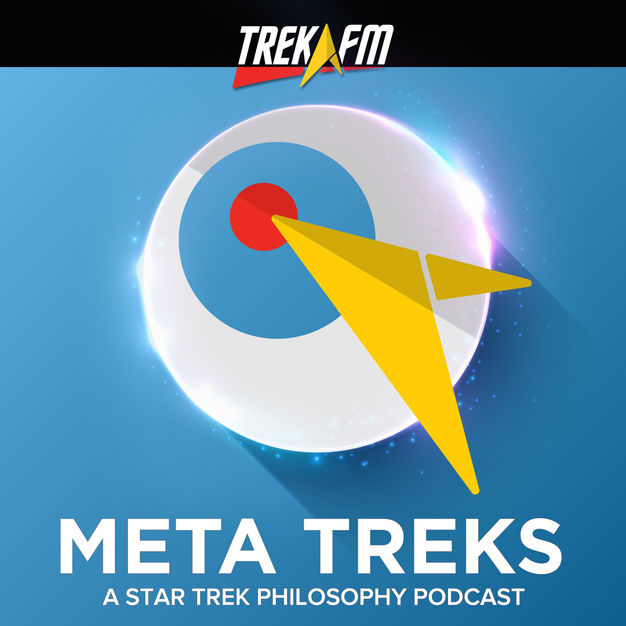
Meta Treks: A Star Trek Philosophy Podcast
Meta Treks is a Trek.fm podcast dedicated to a deep examination of the philosophical ideas found in Star Trek. In each episode, Zachary Fruhling and Mike Morrison take you on a fascinating journey into the inner workings of Star Trek storytelling, deeper into subspace than you've ever traveled before.
- 1 hour 36 minutes98: Geordi's Pedagogically Esoteric PowerPoint Presentations
Gnosticism, Esotericism, and Secrecy in Star Trek. We often take for granted that philosophers and Starfleet officers mean what they say. But there is a rich history of esoteric writing in the history of philosophy, whether for pedagogical, protective, or political purposes. The same is often true within the Star Trek universe itself. All of Star Trek can interpreted as a form of esoteric expression on the part of its creator Gene Roddenberry as a way of expressing his own social and political messages while evading television censors of the late 1960s. And within the Star Trek universe, from starship captains and Federation diplomats to the esoteric practices of and ceremonies of various alien races and religions, certain practices, beliefs, and various forms of dangerous knowledge are kept secret from the average Federation citizen and Starfleet officer. In this episode of Meta Treks, hosts Mike Morrison and Zachary Fruhling lift the veil of secrecy to explore and reveal the many forms of gnosticism, esotericism, and secrecy in the Star Trek universe.
Chapters Intro (00:01:19) Initial Thoughts (00:02:59) The Naivety of Enterprise and Knowledge in the Interstellar Community (00:10:31) Neoplatonist Gnostic Societies (00:14:10) Janeway and the Omega Directive (00:18:02) Different Types of Esotericism (00:20:16) Simon Tarses, Julian Bashir and Defensive Esotericism (00:26:23) Challenging the Notion of the Star Trek Universe as a Utopian Ideal (0030:56) Captain Archer and Political Esotericism in A Night in Sickbay (00:37:44) Deep Space Nine and the Federation Agenda (00:44:08) Pedagogical Knowledge and The Traveler from TNG (00:48:31) Parables, The Gospels, and Theological Esoteric Knowledge (00:53:24) Geordi's Powerpoints and Pedagogical Clarity (00:58:36) Klingon Tea Ceremonies and Performative Expressions of Knowledge (01:04:04) Secret Societies and Secret Knowledge in the Star Trek Universe (01:05:47) Young Tuvok and Pedagogical Esotericism (01:12:29) Is the Q Continuum Q-soteric? (01:14:20) Mysticism and the Vulcans (01:19:08) Justified True Belief and Authentic Esotericism (01:23:35) Closing (01:28:54) Hosts Mike Morrison and Zachary Fruhling Production Mike Morrison (Editor) Zachary Fruhling (Producer) C Bryan Jones (Executive Producer) Matthew Rushing (Executive Producer) Ken Tripp (Executive Producer) Patrick Devlin (Associate Producer) Kay Shaw (Associate Producer) Mark Walker (Associate Producer) Norman C. Lao (Associate Producer) Richard Marquez (Production Manager)
17 August 2020, 9:00 am - 1 hour 33 minutes97: A Real Butterfly
Philosophical Themes in Star Trek: Picard, Season 1.
The recently completed first season of Star Trek: Picard deals with an impressive amount of philosophical material in a mere ten episodes. In this episode of Meta Treks, hosts Zachary Fruhling and Mike Morrison discuss the philosophical themes and concepts within the premier season of Star Trek: Picard. From Rios's broody existentialism to the metaphysics of android neurons, join Zachary and Mike as they practice absolute candor in their discussion of Season 1 of Star Trek: Picard.
Chapters Intro (00:01:19) Initial Thoughts on Season One of Star Trek: Picard (00:03:15) Broody Existentialism and Broken Characters (00:08:50) Picard's Identity and Sartre's First Principle of Existentialism (00:16:08) Aristotelian Acorns and Human Potential (00:29:23) Stoicism and Order Out of Chaos (00:34:14) Starfleet Isn't Starfleet Anymore (00:43:43) Mortality and the Meaning of Life (00:46:30) The "New" Transporter Problem and Consciousness (00:54:26) Consequentialist Ethics and the Death of Bruce Maddox (01:03:15) Philosophy of Mind and Synthetic Picard (01:05:45) Philosophical Disappointments in Star Trek: Picard, Season One (01:11:17) Closing (01:25:12)
Hosts Zachary Fruhling and Mike Morrison
Production Mike Morrison (Editor) Zachary Fruhling (Producer) C Bryan Jones (Executive Producer) Matthew Rushing (Executive Producer) Ken Tripp (Executive Producer) Patrick Devlin (Associate Producer) Kay Shaw (Associate Producer) Mark Walker (Associate Producer) Norman C. Lao (Associate Producer) Richard Marquez (Production Manager) Brandon-Shea Mutala (Patreon Manager)
6 April 2020, 9:00 am - 1 hour 25 minutes96: Andorian Cowboys
Enterprise Season 1 - Essential Trek Philosophy.
Like the first season of any new television series, Season 1 of Enterprise struggled to find its footing, especially coming out of the the successful run of Star Trek: The Next Generation, Deep Space Nine, and Voyager throughout the 1990s. And while Season 1 of Enterprise had important overarching themes, such as human technological progress, showing the Star Trek universe to be a possible future for us in the emerging 21st century, getting back to Star Trek's roots as a "wagon train to the stars," and building unity through diversity, Season 1 of Enterprise had several philosophically important episodes as well. In this episode of Meta Treks, hosts Mike Morrison and Zachary Fruhling discuss the philosophical themes and compare their choices for Essential Trek Philosophy from Season 1 of Star Trek: Enterprise.
Chapters Intro (00:01:19) Initial Thoughts about Enterprise Season One (00:04:07) Understanding the Larger Themes of Enterprise Season One (00:13:28) Star Trek Post September 11th (00:23:52) Terra Nova (00:27:02) Dear Doctor (00:34:44) The Andorian Incident (00:44:23) Shuttlepod One (00:53:41) Breaking the Ice (01:00:17) Detained (01:09:42) Honorable Mention: Fusion (01:14:03) Final Thoughts on the History of Philosophy and Enterprise (01:14:50) Recap of Essential Trek Philosophy (01:17:51) Closing (01:18:38)
Hosts Mike Morrison and Zachary Fruhling
Production Mike Morrison (Editor) Zachary Fruhling (Producer) C Bryan Jones (Executive Producer) Matthew Rushing (Executive Producer) Ken Tripp (Executive Producer) Patrick Devlin (Associate Producer) Kay Shaw (Associate Producer) Mark Walker (Associate Producer) Norman C. Lao (Associate Producer) Richard Marquez (Production Manager)
18 November 2019, 10:00 am - 1 hour 32 minutes95: Eternity is Passé
Death Wish.
Nineteenth-century German philosopher Friedrich Nietzsche held that Western philosophers from Socrates onward have had a gigantic death wish in the form of philosophical escapism and denial of our nature as finite, embodied beings with our own uniquely individual perspectives, drives, and desires. Philosophers in the Q Continuum likewise seem to have a death wish, especially Quinn, the Q Continuum's greatest philosopher.
In this episode of Meta Treks, hosts Zachary Fruhling and Mike Morrison discuss the philosophical and existential themes in the second-season Voyager episode "Death Wish." Although "Death Wish" is usually interpreted as a moral dilemma about assisted suicide—itself a hot moral topic since the 1990s—Zachary and Mike argue instead that "Death Wish" is a subtler but highly-developed example of Nietzschean philosophy of embodiment, perspectivism, and metaphorical self-expression.
Zachary and Mike also discuss the question of meaning as it relates to death, the finitude of human life, and the possibility of immortality—in the Q Continuum or in any form of the afterlife.
Chapters Intro (00:01:19) Initial Thoughts on Voyager: "Death Wish" (00:03:32) Philosophical Overview and Examples of Nietzschean Philosophy (00:06:43) Quinn: Genius or Madman? (00:16:39) The Meaningfulness of Life (00:26:16) The Problem with Perfect Being Theology and the Death of God (00:42:04) Camus and The Myth of Sisyphus (00:43:18) Existentialism and the Subjectivity of Fulfillment in Life (00:48:31) Marcus Aurelius and the Question of Legacy (00:55:15) How the Q Continuum is Depicted in Death Wish (00:58:49) Comparing and Contrasting How Star Trek Depicts the Q Continuum (01:08:25) Is All of Star Trek Escapist? (01:11:38) A Few Final Questions About "Death Wish" (01:21:17) Closing (01:25:56) Hosts Zachary Fruhling and Mike Morrison Production Mike Morrison (Editor) Zachary Fruhling (Producer) C Bryan Jones (Executive Producer) Matthew Rushing (Executive Producer) Ken Tripp (Executive Producer) Patrick Devlin (Associate Producer) Kay Shaw (Associate Producer) Mar Walker (Associate Producer) Norman C. Lao (Associate Producer) Richard Marquez (Production Manager) Brandon-Shea Mutala (Patreon Manager)
29 October 2019, 9:00 am - 1 hour 16 minutes94: Where Are the 24th-Century Space Hippies?
Utopianism in Star Trek.
The Star Trek universe is sometimes claimed to be a utopia. From technological progress to an enlightened view of human nature and equal opportunity, the vision of the future depicted in Star Trek is often touted by fans as the best possible future for humankind. An often-overlooked aspect of utopianism, however, is that "utopia" literally means "no place," calling into question the plausibility of such an optimistic future.
From intragalactic wars to power-hungry admirals to secret government organizations, the struggles of the 23rd and 24th centuries are all very familiar to us here in the 21st century, potentially undermining the very notion of human progress for which Star Trek is so famous. With the overall darker tone of Star Trek: Discovery and, to a lesser extent, Star Trek: Enterprise before that, it is reasonable to ask whether fans themselves, when pressed, really do still believe in the Star Trek vision of the future.
In this episode of Meta Treks, hosts Mike Morrison and Zachary Fruhling discuss utopianism in the Star Trek universe, whether Star Trek should really be considered a utopia after all, the dark sides of "perfect" societies, and the importance of having an idealistic vision of future human society—a modern-day take on a futuristic Plato's Republic—whether or not that ideal future is possible to achieve.
Chapters Intro (00:01:19) Initial Thoughts on Utopianism in the Star Trek Universe (00:01:55) DS9 and Criticisms of Federation Utopia (00:06:33) What Ways is the Society of the 24th Century Utopian? (00:12:50) The Role of Human Improvement in a Utopian Society (00:19:40) Non-Utopian Aspects of Society in Star Trek (00:21:48) Do Fans Believe in the Utopian Message of Star Trek? (00:33:50) Plato's Republic and the Perfect Society (00:42:23) Counter Culture Moving Humanity Forward (00:50:11) Kirk: Destroyer of Utopias vs. Picard: Preserver of Utopias (00:57:50) Final Thoughts (01:06:07) Closing (01:09:34)
Hosts Mike Morrison and Zachary Fruhling
Production Mike Morrison (Editor) Zachary Fruhling (Producer) C Bryan Jones (Executive Producer) Matthew Rushing (Executive Producer) Ken Tripp (Executive Producer) Patrick Devlin (Associate Producer) Kay Shaw (Associate Producer) Mark Walker (Associate Producer) Norman C. Lao (Associate Producer) Richard Marquez (Production Manager) Brandon-Shea Mutala (Patreon Manager)
4 June 2019, 9:00 am - 1 hour 12 minutes93: In a Relevantly Similar Possible Universe, I Would Always Have Been Your Friend, Jim
Alternate Universes and Modal Realism.
The Star Trek franchise is full of alternate universes, from different quantum realities (TNG: "Parallels") and the alternate reality seen in the Kelvin timeline (Star Trek, 2009) to the Mirror Universe seen in the Original Series, Star Trek: Deep Space Nine, and Star Trek: Discovery. In Star Trek, these alternate universes are just as real as the actual universe, a philosophical position known as "modal realism." In this episode of Meta Treks, hosts Zachary Fruhling and Mike Morrison debate modal realism, the reality of alternate universes, through the lens of the Star Trek universe and whether we should consider alternate realities or "possible worlds" to be as metaphysically real as our own actual universe.
Chapters Intro (00:01:19) Initial Thought on Modal Realism (00:04:04) What Difference Does It Make? (00:08:45) David Lewis and Counterfactuals (00:12:36) Modal Concepts (00:17:43) The Distinction and Contrast of the Mirror Universe in Star Trek (00:20:46) Quantum Branching (00:29:50) Gottfried Leibniz and "Best of All Possible Worlds" (00:34:28) Is Modal Realism a Scientific Question or a Philosophical Question? (00:39:00) The Space Between the Spaces (00:43:26) Different Types of Possible Universes (00:45:20) Criticisms of Modal Realism (00:57:13) Diverging Universes (01:00:10) Closing (01:05:03)
Hosts Zachary Fruhling and Mike Morrison
Production Mike Morrison (Editor) Zachary Fruhling (Producer) C Bryan Jones (Executive Producer) Matthew Rushing (Executive Producer) Ken Tripp (Executive Producer) Patrick Devlin (Associate Producer) Kay Shaw (Associate Producer) Mark Walker (Associate Producer) Norman C. Lao (Associate Producer) Richard Marquez (Production Manager) Brandon-Shea Mutala (Patreon Manager)
6 May 2019, 9:00 am - 1 hour 20 minutes92: Prepaid Long-Distance Mind Meld
Discovery Season 1 - Essential Trek Philosophy.
We in the 21st century do not live in an age of mythology as the ancient Greeks and Romans did, with epic heroes and narratives to provide context and meaning for our lives. Yet we hunger and thirst for meaning, as humans have done since the dawn of human history and consciousness. To its fans, Star Trek has become a form of modern mythology, with its own ethos, purposefulness, and meaningfulness, and with its own epic heroes—whether Captain Kirk in the Original Series or Michael Burnham in Star Trek: Discovery—whose journeys, struggles, and overcoming of obstacles are reminiscent of the existential journeys of classical epic heroes, from Odysseus in Homer's Odyssey to Dante Alighieri in the Divine Comedy.
In this episode of Meta Treks, hosts Mike Morrison and Zachary Fruhling discuss the philosophical themes in season one of Star Trek: Discovery, from speculative and theoretical issues in contemporary physics and biology—emergence, panspermia, and panpsychism—to existential questions of self-identity and self-definition—including the rise, fall, and redemption of Michael Burnham, the Federation's struggle to maintain its ideals during wartime and in the face of imminent threats to its very existence, and the emerging unification and national identity of the Klingon Empire.
Chapters Intro (00:01:19) Initial Thoughts About Star Trek: Discovery - Season One (00:2:31) Essential Trek Philosophy Essentials (00:17:19) Context is for Kings (00:19:06) The Vulcan Hello / Battle at the Binary Stars (00:27:07) The Butcher's Knife Cares Not for the Lamb's Cry / Choose Your Pain (00:37:50) Lethe (00:42:43) Will You Take My Hand? (00:50:54) Magic to Make the Sanest Man Go Mad (00:59:03) Final Thoughts (01:04:58) Recap (01:12:48) Closing (01:13:55)
Hosts Mike Morrison and Zachary Fruhling
Production Mike Morrison (Editor) Zachary Fruhling (Producer) C Bryan Jones (Executive Producer) Matthew Rushing (Executive Producer) Ken Tripp (Executive Producer) Patrick Devlin (Associate Producer) Kay Shaw (Associate Producer) Mark Walker (Associate Producer) Norman C. Lao (Associate Producer) Richard Marquez (Production Manager) Brandon-Shea Mutala (Patreon Manager)
21 January 2019, 10:00 am - 1 hour 5 minutes91: Get That Whale Some Gumbo
Equality and Equal Rights.
Equality in the United Federation of Planets is often taken for granted, that alien life forms are entitled to the same rights, privileges, and opportunities as humans. But to which beings does this equality extend? Humanoids? Only sentient life forms? Intelligent androids? Whales? Nanites? And equality in what sense? Political equality? Moral equality? Equality under the law? Equality of opportunity?
In this episode of Meta Treks, hosts Zachary Fruhling and Mike Morrison discuss the philosophy of equality in the Star Trek universe, from issues of accessibility for disabled Starfleet officers such as Commander LaForge (TNG) and Ensign Melora (DS9: "Melora"), to the rights of non-humanoid life forms, whether intelligent whales here on Earth (Star Trek IV: The Voyage Home) or non-human aliens such as the Horta (TOS: "The Devil in the Dark") and the Sheliak (TNG: "The Ensigns of Command").
Chapters Intro (00:01:19) Equality - Making a Distinction (00:03:16) Political Equality Over Time in Star Trek (00:04:49) Moral Equality in the Federation (00:11:22) Moral Equality and Future Potential (00:20:25) Equality Under the Law, Equal Rights, and the Ethics of Care (00:28:07) Equality and Exploitation (00:33:48) Deep Space Nine and Equal Opportunity (00:36:34) Starfleet and the Federation: Is the Captains Life More Valuable? (00:46:42) Our Attitude Toward Other Cultures in the 24th Century (00:55:34) Closing (00:58:52)
Hosts Zachary Fruhling and Mike Morrison
Production Mike Morrison (Editor) Zachary Fruhling (Producer) Bryan Jones (Executive Producer) Matthew Rushing (Executive Producer) Ken Tripp (Executive Producer) Patrick Devlin (Associate Producer) Kay Shaw (Associate Producer) Mark Walker (Associate Producer) Norman C. Lao (Associate Producer) Richard Marquez (Production Manager) Brandon-Shea Mutala (Patreon Manager)
14 January 2019, 10:00 am - 1 hour 17 minutes90: ODD (Omniscience Deficit Disorder)
The Q Continuum.
From the The Original Series onward, Star Trek has had a preoccupation with false gods, culminating in the introduction of Q and the Q Continuum in Star Trek: The Next Generation. But although members of the Q Continuum have many of the properties usually ascribed to deities—such as omnipotence, omniscience, omnipresence, and so on—do they posses these qualities to sufficient degree to be considered genuine deities of the Star Trek universe?
In this episode of Meta Treks, hosts Mike Morrison and Zachary Fruhling give a philosophical analysis of the Q Continuum and the deity-like attributes of the Q. From paradoxes of omnipotence, such as the Q being powerful enough to create a prison another Q cannot break out of, to the many things the Q don't seem to know despite their supposed omniscience, Mike and Zachary debate, and perhaps debunk, the status of the Q as deities.
Chapters Intro (00:01:19) Should We Consider the Q to be Deities? (00:02:42) Q and the Q Continuum (00:07:34) The Tension Between Transcendence and Immanence (00:14:44) Contrasting The Q Continuum with the DS9 Prophets (00:20:08) Are the Q Omnipresent? (00:23:18) Are the Q Omnipotent? (00:27:32) Are the Q Omniscient? (00:35:00) Attributes Not Found Among The Q (00:43:34) Should The Q Have a Moral Obligation? (00:47:48) Star Trek and False Gods (00:53:23) The Visualizations of the Q Continuum (01:03:54) Closing (01:11:07)
Hosts Mike Morrison and Zachary Fruhling
Production Mike Morrison (Editor) Zachary Fruhling (Producer) C Bryan Jones (Executive Producer) Matthew Rushing (Executive Producer) Ken Tripp (Executive Producer) Patrick Devlin (Associate Producer) Kay Shaw (Associate Producer) Mark Walker (Associate Producer) Norman C. Lao (Associate Producer) Brandon-Shea Mutala (Patreon Manager)
8 October 2018, 9:00 am - 1 hour 22 minutes89: Faustian Horseback Ride
Philosophical Themes in "The Cage."
In the opening scenes of "The Cage," the unaired pilot episode of Star Trek: The Original Series, Captain Christopher Pike is having an existential crisis, feeling the weight of his responsibility as a starship captain, being responsible for the lives of the people under his command, and longing for a different kind of life (being home on Earth with a picnic lunch and horseback riding every day, or perhaps becoming an Orion trader). When Captain Pike is imprisoned by the Talosians and given the chance to have his every wish granted as an illusion, Captain Pike is forced to grapple with what he really wants in life and with the true nature of human happiness.
In this episode of Meta Treks, hosts Zachary Fruhling and Mike Morrison discuss the philosophical themes in "The Cage," from the existential angst of free will, making choices, and the burdens of responsibility, to the importance of human freedom and free will, risks and rewards, and of looking to the future and setting a course for the next adventure.
Chapters Intro (00:01:19) Criticisms and Observations of The Cage (00:03:34) Alien Commentary (00:08:23) Zoo: Humans as a Lower Life form (00:14:04) Existential Tiredness (00:17:40) A Galaxy of Illusions to Choose From (00:30:18) The Pleasure Machine (00:35:43) The Worth of a Man's Soul (00:38:37) The New Adam and Eve (00:45:11) A Faustian Deal with the Devil (00:50:41) Free Will and the Human Condition (00:55:16) Aftermath of Talosian War (01:00:37) Final Thoughts About The Cage (01:07:06) Closing (01:14:09)
Hosts Zachary Fruhling and Mike Morison
Production Mike Morrison (Editor) Zachary Fruhling (Producer) C Bryan Jones (Executive Producer) Matthew Rushing (Executive Producer) Ken Tripp (Executive Producer) Patrick Devlin (Associate Producer) Kay Shaw (Associate Producer) Mark Walker (Associate Producer) Norman C. Lao (Associate Producer) Richard Marquez (Production Manager) Brandon-Shea Mutala (Patreon Manager)
24 September 2018, 9:00 am - 1 hour 25 minutes88: Spock's Altered States of Consciousness
The Original Series Season 1 - Essential Trek Philosophy.
The entire Star Trek franchise, with over 700 television episodes and 13 feature films (to date), owes its existence to the strength of season 1 of Star Trek: The Original Series. If season 1 hadn't been as strong as it was, we wouldn't have the Star Trek franchise we know and love today. Season 1 of The Original Series isn't just strong dramatically, however. It is also strong philosophically, episode by episode exploring abstract ideas, future human potential, and the human condition.
In this episode of Meta Treks, hosts Mike Morrison and Zachary Fruhling go back to where it all began in a discussion of their top picks for Essential Trek Philosophy from season 1 of Star Trek: The Original Series. Join Mike and Zachary as they discuss the four dominant philosophical themes in the premiere season of Star Trek: ethical and moral dilemmas, transhumanism and future human potential, the internal struggle of conflicting human natures, and the ethics of war.
Chapters Intro (00:01:19) Initial Thoughts on TOS Season One (00:01:58) The Four Main Philosophical Themes (00:10:26) Moral Choices and Ethical Conundrums (00:14:54) The City on the Edge of Forever (00:15:07) Transhumanism (00:21:13) The Cage (00:22:24) Arena (00:26:28) Errand of Mercy (00:28:11) The Return of the Archons (00:33:39) Space Seed (00:37:47) Where No Man Has Gone Before (00:39:52) Charlie X/The Squire of Gothos (00:40:30) What Are Little Girls Made Of? (00:42:32) Miri (00:46:13) Dagger of the Mind (0047:31) Exploration of Human Nature (00:50:49) The Enemy Within (00:52:06) The Conscience of the King (00:56:21) The Alternative Factor (00:58:03) Ethics of War (01:03:48) Balance of Terror (01:04:33) A Taste of Armageddon (01:06:14) This Side of Paradise (01:08:35) Devil in the Dark (01:11:38) Recap and Final Thoughts (01:15:08) Closing (01:18:31)
Hosts Mike Morrison and Zachary Fruhling
Production Mike Morrison (Editor) Zachary Fruhling (Producer) C Bryan Jones (Executive Producer) Matthew Rushing (Executive Producer) Ken Tripp (Executive Producer) Patrick Devlin (Associate Producer) Kay Shaw (Associate Producer) Mark Walker (Associate Producer) Norman C. Lao (Associate Producer) Richard Marquez (Production Manager) Brandon-Shea Mutala (Patreon Manager)
2 July 2018, 9:00 am - More Episodes? Get the App
Your feedback is valuable to us. Should you encounter any bugs, glitches, lack of functionality or other problems, please email us on [email protected] or join Moon.FM Telegram Group where you can talk directly to the dev team who are happy to answer any queries.
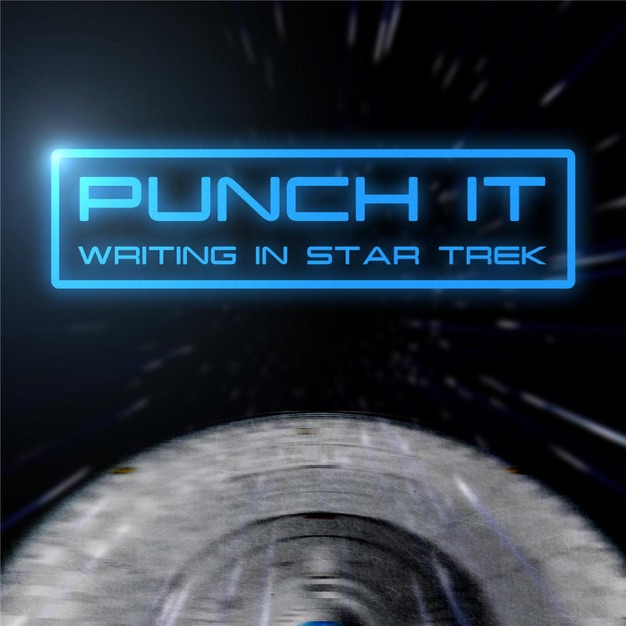 Punch It: Writing in Star Trek
Punch It: Writing in Star Trek
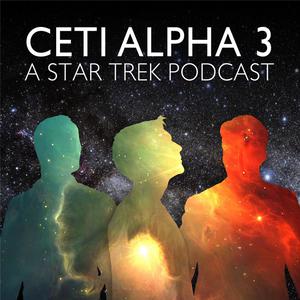 Ceti Alpha 3: A Star Trek Podcast
Ceti Alpha 3: A Star Trek Podcast
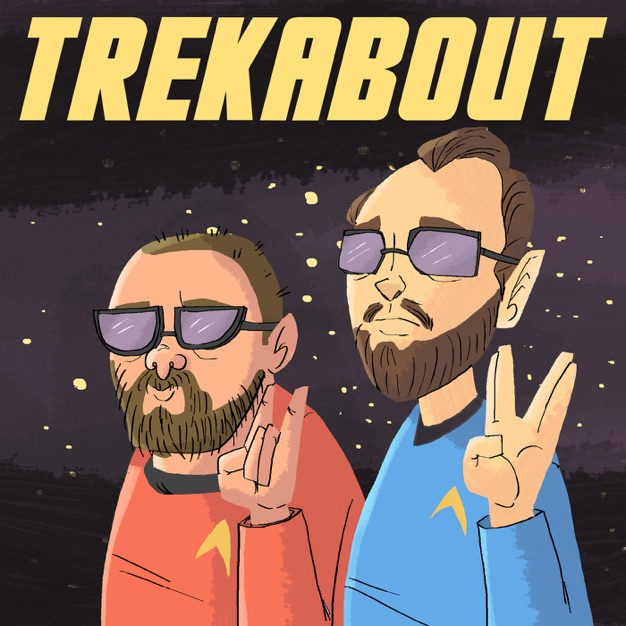 Trekabout: A Star Trek Podcast
Trekabout: A Star Trek Podcast
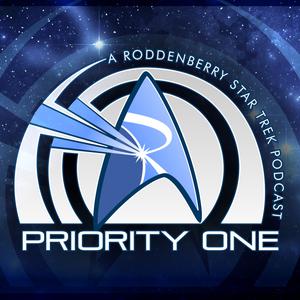 Priority One: A Roddenberry Star Trek Podcast
Priority One: A Roddenberry Star Trek Podcast
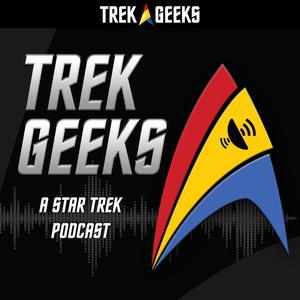 Trek Geeks: A Star Trek Podcast
Trek Geeks: A Star Trek Podcast
 Women at Warp: A Star Trek Podcast
Women at Warp: A Star Trek Podcast